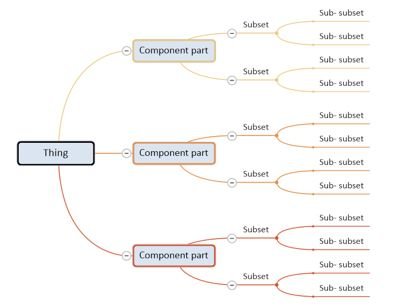How to Understand More
How to Understand More
To understand more, remember this:
- Nothing is ONE thing. Everything consists of a larger number of component parts.
- Nothing is isolated. Everything sits with a surrounding context.
1. Nothing is ONE thing. Everything consists of a larger number of component parts.
In order to fully understand anything, break it down into its component parts; give each part a name; then figure-out the internal relationship that exits between the component parts.
Re-iterate the process; because each part you named, is itself made up of its component parts, and can be resolved into its subsets, then named, and their internal relationships established.
Each time you re-iterate this process of analysis, your level of understanding increases.
For example: The human body is not a single entity. It consists of a number of sub-systems:
- the skeletal system
- the circulatory system
- the digestive system
- the muscular system
- the nervous system, etc.
When you have resolved the human body into its component sub-systems, you have completed a first level analysis, achieving a higher level of understanding than you had when you started.
To increase your understanding still further, you could make a second level analysis.
For example, the nervous system is not a single thing either. It too is a system of systems: the peripheral nervous system and the central nervous system.
And the third level analysis would take the central nervous system and resolve that into its component parts.
Each time you resolve something into its component parts and name them, you increase your level of understanding.
This is an endless process, since you wont live long enough to become all-knowing.

2. Nothing is isolated. Everything sits within a surrounding context.
Analysis is the act of "burrowing down" into a thing, or idea, to understand it in ever greater detail.
There is an opposite process, called synthesis.
Synthesis is about looking at the big picture.
Everything is part of a bigger whole. And you gain a full understanding only if you grasp how a thing fits into the bigger picture, (its context).
You must never think of anything as if it sits alone, in splendid isolation.
Everything is affected by its surrounding context. And everything forms part of the context for the other things that surround it.
For example, each individual human being is surrounded by a social, physical, historical, technological, political and economic context.
To FULLY understand what a human being really is, you must first figure-out how the human being fits into its larger context.
- Always take the context into account.
- Never take any fact or statement out of context.
- Your brain can perform both analysis and synthesis.
- Analysis is the act of breaking things down into their sub-set parts.
- Synthesis is the act of putting parts into larger wholes. (Larger holes?)
To understand anything better, practice the twin arts of analysis and synthesis.
Definition: analysis
Analysis is a learning process that breaks any subject into smaller named parts, then shows how those parts link. By repeating this step-down study, you strip away confusion and see how the whole works. Without this step-by-step breakdown, clear and deep understanding is impossible.
Show CG4D Definition
- Breaks a topic into smaller parts
- Gives each part a clear name
- Studies how the parts connect
- Repeats the break down to reach clarity
Article Summary
Break any idea into named parts, map how they link, then place the whole in its wider world; this blend of analysis and context turns loose facts into lasting understanding.
Frequently Asked Questions
Here are some questions that frequently get asked about this topic during our training sessions.
What is analysis in simple terms?
How does synthesis differ from analysis?
Why name each part when breaking something down?
How can I apply analysis when revising for exams?
Why is context vital for understanding?
How do analysis and synthesis build critical thinking?
Can this method solve everyday problems?
Thought of something that's not been answered?
Did You Know: Key Statistics
LinkedIn Learning Workplace Learning Report 2024 shows 71% of global L&D leaders rate critical thinking and problem solving as the most important skill gaps to close over the next 12 months. A 2024 meta-analysis in the Journal of Educational Psychology found that students taught to break topics into named sub-parts and then recombine them scored 27% higher in comprehension tests than control groups.Blogs by Email
Do you want to receive an email whenever we post a new blog? The blogs contain article 5-10 minutes long - ideal for reading during your coffee break!
Further Reading in General Development
-
How to Inspire People With Different Motivational Methods
Learn why fear and anger fail and how positive motivation built on desire inspires teams to excel. Gain practical tips and leadership training links. Act now.
Read Article > -
April is Stress Awareness Month
April is Stress Awareness Month. Learn why some stress helps, avoid harmful stress, stay in Perfect Balance and join online stress management training today now
Read Article > -
10 Ways To Improve Remote Online Training
Learn ten proven ways to make remote online training lively, interactive and effective. Boost learner engagement, recall and results with practical, easy tips.
Read Article > -
How to Achieve Work-Life Balance: A Conversation Between Friends
Learn practical work life balance steps: rate time use, set goals, boost health, manage stress daily. Simple tips help you stay calm, fit and productive.
Read Article > -
How to Create a Successful Remote Training Session
Master remote training with smart tech, lively trainer delivery and prepared, engaged learners. Follow our tips to run online sessions that match classroom .
Read Article >
Looking for Leadership and Management Training?
If you're looking to develop your General Development Skills, you may find this Leadership and Management Training Course beneficial:
Open Training Course Pricing and Availability
Next Open Course Starts in 8 days, Manchester City, places available






